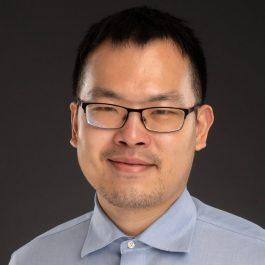
Kendrick Li, PhD kicked off the University of Washington Department of Biostatistics Fall 2024 Seminar Series on September 26 with a talk about causal inference. Li graduated from the UW Biostatistics PhD Program in 2021 and, after a postdoc at the University of Michigan, joined the faculty at St. Jude Children’s Research Hospital.
How would you compare your experience as a PhD student to being a postdoc at Michigan to becoming a member of the St. Jude faculty?
I will quote one of my classmates who said he had the most wonderful research experience during postdoc: “You already know how to do research, you don’t have extra RA or TA responsibilities or a course load, and your research projects are likely to be grant funded.” I agree with all of this. I did my postdoc during COVID and the stable pace of research is one of the things that kept me sane. Now as a faculty member, I have more responsibilities towards others. I have a stable source of collaborative research in St. Jude’s active biological and epidemiological research community.
How did your research focus or interest evolve over this time period?
I came from a biology undergrad major. During my PhD study, I spent so much time trying to explore different areas, I missed the chance to go deep into one area. On the other hand, the efforts paid off because my current job often requires knowledge of different types of statistical methods. I cannot express my gratitude enough to my PhD advisors and other faculty who gave me the support and opportunities to learn and grow as a biostatistician and a researcher.
During postdoc, I knew my own research interests better and my three amazing mentors also gave me valuable guidance on causal inference research. Now, due to the needs of my job, I found my interest in statistical method research shifting again. To me, it is still an ongoing process.
What did you value most about your PhD student experience?
I had so much support from my friends, staff and faculty, both academically and personally. Even now when it has been more than three years since I left UW biostatistics, I still have the fondest memories of the people in the UW Biostatistics community.
What were your greatest challenges as a PhD student?
This repeats what I said earlier. As I came from a biology undergrad major, I constantly worried about not knowing what to do for my next project. It is fair to say I didn’t have the ability to spot good research opportunities when I saw them.
What advice would you give to an international student considering the UW Biostatistics PhD program?
The candidate pool is getting more and more competitive! As one of the most prestigious biostatistics PhD programs in the United States, you may be competing with others who have perfect grades and some research experience. Hard work and preparedness in both coursework and research will help your profile stand out.
What advice would you give to current PhD students and those getting ready to graduate from the program?
So many factors will decide whether you will succeed in the program. As people say, opportunities only come to those who are prepared, so hard work never goes wrong. But a PhD is a marathon, and it is natural to want a break from time to time. I think knowing how to take breaks (and how to get back to work) is an important skill to avoid burnout.